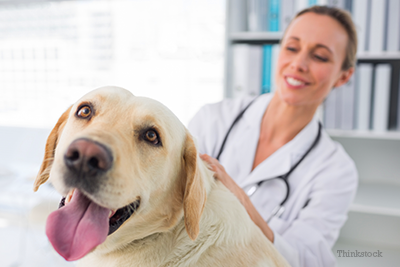
Wouldn’t it be grand if our pets didn’t have to poop? There would be no litter boxes to clean, no carrying plastic bags laden with feces when walking the dog and no inadvertently stepping in a fresh pile of poo when walking across the lawn. Alas, poop production is simply a normal part of life. What goes in, must come out.
So, how do veterinarians put a positive spin on pet poop? No problem! Those of us in the profession deal with fecal matter day in and day out—either testing it or cleaning it up. If we didn’t figure out ways to get along well with pet poop, we might just go crazy! Here are five examples of how veterinarians manage to have some fun with their patients’ poop:
1. Egg hunts
This is an Easter egg hunt done veterinary medicine style. Screening a pet for intestinal worms involves mixing a poop sample with a special liquid, spinning it in a centrifuge and then looking at the concoction under the microscope. One peers through the lens, adjusts the focus, scans around, and then, bingo! One might just find some parasite eggs! Finding eggs is always exciting, and when there’s more than one type of egg present, it’s like winning the fecal lottery!
Click here to learn more about intestinal parasites in dogs.
2. Getting the stool sample without it getting you
Clients come up with some pretty creative containers in which to deliver their pets’ poop samples. Imagine a plastic grocery bag, or one of those long plastic bags that your newspaper is packaged in on a rainy day. Now imagine a soft, mushy stool sample or some “Kitty Roca” at the very bottom of one of those bags. How are you going to get to the poop without fecalizing your forearm? Trust me when I tell you that it’s a challenge. I would tell you how, but it’s a trade secret.
Click here for 7 hilariously bad ways to collect a poop sample, and to learn the right way.
3. Poop interrogations
When a client tells me that their pet has diarrhea, my exam room morphs into an interrogation room and I ask questions as if I’m a police detective investigating a crime.
- Any blood?
- Any mucus?
- Any straining?
- Any urgency?
- How large are they?
- How many bowel movements per day?
The answers to these questions help pinpoint if the cause of the diarrhea is within the small intestine, the large intestine or both. This is critical information in my world, and when my client knows the answers to all of my questions, it makes my day!
Click here to learn more about blood or mucus in your dog's stool.
4. Retrieval of valuable objects
Imagine this scenario. “Bad dog” ate his human’s diamond engagement ring. X-rays tell me that the ring has made it all the way down to “bad dog’s” colon (the very end of the intestinal tract). We keep “bad dog” in the hospital and watch him like a hawk. The minute he produces a poop sample we attack it with a tongue depressor, hoping to strike gold (and diamonds). After 12 hours in the hospital, the third turd is the charm. The ring is found, thoroughly washed, and delivered back to his human. “Bad dog” goes home with hopes that he will become a “good dog” and that his human will find a more secure system to safeguard her jewelry.
Click here to learn about puppy proofing your home.
5. Responding to poopy emails
When I receive an email from a client containing a photo attachment of their pet’s poop, I enjoy the mental exercise of crafting a response. I allow myself a few moments of unadulterated enjoyment, fantasizing about what I would say if I were lacking inhibitory neurons. I then move on to crafting an email response that is both tactful and appreciative of my client’s good intentions. I gently explain that a photo can’t possibly take the place of viewing the poop (and the animal) up close and personal. How do I respond to client emails with logs (pun intended) of poop data such as turd weight and diameter? I advise these folks to do whatever makes them happy, but no need to include me in the process.
Next, click here to see what your veterinarian can learn from a poop sample.
